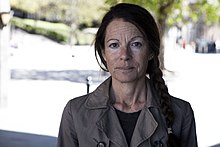Pernilla Wittung-Stafshede
Pernilla Wittung-Stafshede | |
|---|---|
 | |
| Born | August 31, 1968 |
| Nationality | Swedish |
| Citizenship | Swedish |
| Alma mater | Chalmers University of Technology |
| Scientific career | |
| Fields | Biochemistry |
| Thesis | Intelligent nucleic acid interactions with peptide nucleic acids and in recombination proteins (1996) |
| Doctoral advisor | Bengt Nordén |
Pernilla Wittung-Stafshede (maiden name Wittung) is a Swedish biophysical chemist, born in 1968, who is a professor of chemical biology at Chalmers University of Technology in Gothenburg.
Education[]
She received her Master of Science Degree in Engineering from Chalmers University of Technology and a doctorate at the same institution in 1996 in biophysical chemistry under Bengt Nordén,[1] with a thesis entitled Intelligent nucleic acid interactions with peptide nucleic acids and in recombination proteins.[2]
Employment[]
After her Ph.D., she worked for twelve years in the United States at the California Institute of Technology, Beckman Institute in Pasadena, California (1997-98), Tulane University in New Orleans, Louisiana[3] (1999-2003) and Rice University in Houston, Texas[4] (2004-2008).[5]
In 2008, she returned to Sweden to a professor position at Umeå University. Since September 2015, she has been a professor at Chalmers University of Technology and is the head of the Chemical Biology division. She leads a research group that focuses on the biophysical properties of proteins; both metal-transporting proteins and proteins that fold incorrectly and clump together. The research is basic science, but has links to diseases such as Alzheimer's, Parkinson's and cancer.[6]
In 2010, Pernilla Wittung-Stafshede was one of ten researchers in Sweden who was appointed as a Wallenberg Scholar, with a five-year grant awarded by the Knut and Alice Wallenberg Foundation.[7]
In 2017 she was elected a member of the council of Biophysical Society (BPS).[8] It was the second time ever for a Swedish scientist; the first one was Arne Engström 1960–1963.[9]
Awards and honors[]
Pernilla Wittung-Stafshede has received a number of awards and prizes. These include:
- National Fresenius Award in 2003, awarded by the American Chemical Society Phi Lambda Upsilon to young eminent chemistry researchers.[10]
- Göran Gustafsson Prize in Chemistry in 2009, awarded by the Göran Gustafsson Foundation and the Royal Swedish Academy of Sciences.[11]
- in 2009, awarded by the Royal Swedish Academy of Sciences.[12]
- STIAS fellow in 2013, awarded by the , South Africa.[13]
- Svante Arrhenius plaque in 2016, awarded by the Swedish Chemical Society in collaboration with the Royal Swedish Academy of Sciences.[14]
- Elected member of the Royal Swedish Academy of Sciences, 2016.[15]
- Elected member of the Royal Society of Arts and Sciences in Gothenburg, 2016.[16][17]
Bibliography[]
- Natura: [for secondary school grades]. Biology 3, Life in development, co-author of the chapter A researcher tells, Liber, Stockholm, 1997, pp 88-89 ISBN 91-47-01174-2
- Protein Folding and Metal Ions - Mechanisms, Biology and Disease Editors: Pernilla Wittung-Stafshede, C. Gomes Taylor & Francis Books Inc. Oct 22, 2010 under imprint CRC Press ISBN 9781439809655
Scientific articles[]
Pernilla Wittung-Stafshede has published more than 200 scientific articles in peer-reviewed journals (January 2017).[18]
Debate articles[]
Is the Gender Gap Solved in Liberal Sweden? Debate article, published on STEM Women website.[19]
Academia in Sweden is not as equal as you think. Debate article in Swedish in the Swedish Research Council’s web magazine Curie.
Other[]
In 2016, she was a guest blogger for the Research Council's web magazine Curie.[20]
References[]
- ^ http://www.chalmers.se/chem/EN/divisions/physical-chemistry/nordenlab/former-members Retrieved 14 July 2017
- ^ http://publications.lib.chalmers.se/publication/1105-intelligent-nucleic-acid-interactions-with-peptide-nucleic-acid-pna-and-recombination-enzyme-reca Retrieved 7 March 2017
- ^ "Tulane University - Protein Folding Unraveled". www2.tulane.edu. Retrieved 2017-07-17.
- ^ "Home Page". www.bioc.rice.edu. Archived from the original on 2005-12-18. Retrieved 2017-07-17.
- ^ "Pernilla Wittung-Stafshede new Head of Division of Chemical Biology". www.chalmers.se. Retrieved 2017-07-17.
- ^ "Pernilla Wittung Stafshede". www.chalmers.se. Retrieved 2017-07-17.
- ^ https://www.wallenberg.com/kaw/en/research/protein-research-can-alter-our-view-how-diseases-develop Archived 2017-03-08 at the Wayback Machine Retrieved 7 March 2017
- ^ "Biophysical Society Council 2017 Election Results" (PDF). Biophysical Society. Retrieved 15 August 2017.[dead link]
- ^ Society, Biophysical. "Past Council". www.biophysics.org. Retrieved 2017-08-15.
- ^ "National Fresenius Award". chemgroups.northwestern.edu. Retrieved 7 March 2017.
- ^ "Prizes and medals acknowledged during the Royal Swedish Academy of Sciences' 187:th annual meeting". Royal Swedish Academy of Sciences. Retrieved 7 March 2017.
- ^ "Prizes and medals acknowledged during the Royal Swedish Academy of Sciences' 187:th annual meeting". Royal Swedish Academy of Sciences. Retrieved 7 March 2017.
- ^ "Fellows". Stellenbosch Institute for Advanced Studies. Retrieved 7 March 2017.
- ^ "List of recipients". Swedish Chemical Society. Retrieved 7 March 2017.
- ^ "Pernilla Wittung Stafshede". Royal Swedish Academy of Sciences. Retrieved 7 March 2017.
- ^ "Wittung-Stafshede new member of KVVS". Chalmers University of Technology. Retrieved 7 March 2017.
- ^ "Fellows". Royal Society of Arts and Sciences in Gothenburg. Archived from the original on 6 May 2013. Retrieved 7 March 2017.
- ^ "Scopus - Author details (Wittung-Stafshede, Pernilla)". Scopus. Retrieved 7 March 2017.
- ^ "Is the Gender Gap Solved in Liberal Sweden?". STEM Women. 21 March 2016. Retrieved 7 March 2017.
- ^ "Guest blogger Pernilla Wittung-Stafshede". Swedish Research Council's web magazine Curie. Retrieved 7 March 2017.
External links[]
- Pernilla Wittung-Stafshede’s personal page on Chalmers website
- Publications registered for Pernilla Wittung in Chalmers Publication Database, CPL (1994-1997)
- Publications registered for Pernilla Wittung-Stafshede in the Chalmers Publication Database, CPL (1998-now)
- Citations according to Google Scholar
- Chemical Biology, division in the Biology and Biological Engineering department at Chalmers University of Technology
- Wittung-Stafshede’s Protein Biophysics Lab, Chalmers University of Technology
- 1968 births
- Living people
- Swedish biochemists
- Swedish women chemists
- Chalmers University of Technology faculty
- Chalmers University of Technology alumni